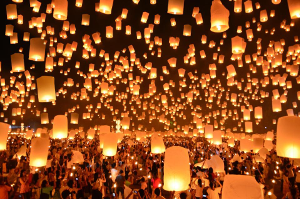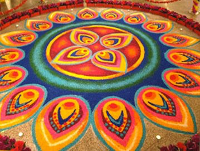Diwali is the Hindu Festival of Lights, an annual celebration of the success of light in defeating darkness.

People celebrate Diwali for different reasons depending on where they live. In one tradition, the celebration honors the defeat of Ravana by Lord Rama and the return of Lord Rama from 14 years in exile. According to the Hundu epic Ramayana, Lord Rama was then crowned the king of Ayodhya and the people lit lamps in celebration.
Another association is with Lakshmi, the goddess of wealth and prosperity, and her marriage to the god Vishnu. One tradition has it that the first day of Diwali marks the day that Lakshmi was born.
Diwali (Deepavali) is actually five days of celebration, although one day is considered the most festive and significant. Like Easter, Diwali's dates for celebration move around on the calendar. Diwali is in the Hindu calendar month of Karthik, usually in October or November on the Western calendar; the exact date is determined by calculations involving the Hundu lunar calendar and the position of the Moon.
The names of the festival are different in various parts of India.
- The first day is Dhanteras, dedicated to celebrating prosperity.
- The second day is Chhoti Diwali (or Naraka Chaturdasi), marking the victory of Lord Krishna over the powerful evil entity Narakasura.
- Diwali (or Lakshmi Puja) is the third day and is the most significant. Temples the world over are awash in light from candles and oil lamps. This is also the last day of the Hindu year in many regions of India.
- Annakut (or Padwa or Govardhan Puja) is the fourth day, commonly called the Hindu New Year. It's all about the food on this day, but the food is not for people but for the Lord Krishna.
- The last day of celebrations is Bhai Dooj, or "Brothers Day." This day is all about the bond between brothers and sisters.
It's not just a Hindu holiday, though. Members of the Jain and Sikh faiths celebrate as well.

Usual celebrations include fireworks, street parties, gift-giving, and lots of festive festival food. Another common symbol of Diwali is the wearing of new clothes.
People light earthen candles, called diyas, as a symbol of the light. Colorful works of art dot the floors of houses. House cleaning and renovations or repairs are also associated with Diwali.
All in all, Diwali is a festival associated with family. Families gather together on one if not all five days, to eat special foods and recite prayers and holy songs, to give one another gifts, and to give thanks for the light.